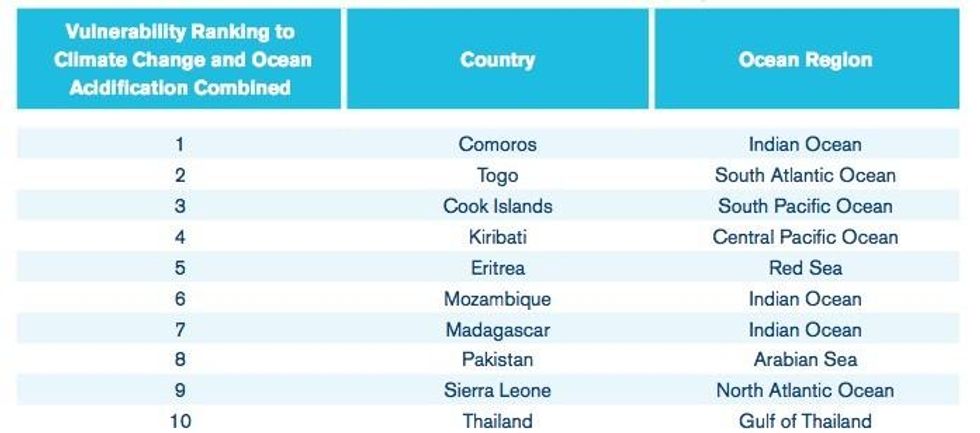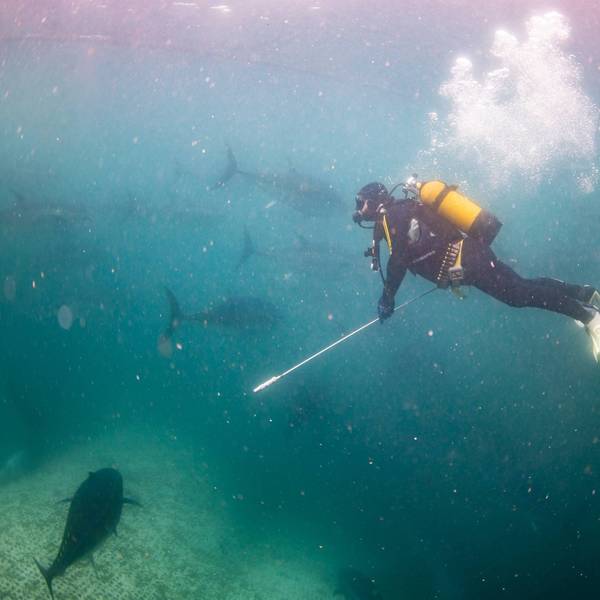Climate Change, Ocean Acidification Threaten Food Security of Billions
CO2 emissions pushing fish, seafood into colder waters and wreaking habitats
Climate change and ocean acidification are threatening food security for billions of people who depend on fish and seafood for all or part of their diets, according to a report released Monday from ocean conservation group Oceana.
These two factors are pushing fish into colder waters and destroying habitats. But "most small-scale fishermen simply aren't capable of following fish into distant waters as climate change and ocean acidification wreak havoc on coastal resources," said Matthew Huelsenbeck, report author and marine scientist at Oceana.
Most of the nations topping the lists are those that have been least responsible for rising CO2 levels, stated Huelsenbeck, stressing that "it will be the poorest artisanal fishermen that will be hit hardest."
The loss of the seafood will have public health consequences on local populations as well.
Higher temperatures in oceans can lead to Vibrio cholerae in shellfish, which leads to the disease cholera in humans, as well as Vibrio parahaemolyticus, a leading cause of seafood- associated gastroenteritis in the U.S., the reports notes.
Public health will also suffer as populations may switch to more processed foods as seafood stapes are unavailable. "Wild caught seafood is often one of the healthiest and most accessible options for protein in coastal and small island nations. Losing this resource may mean more dependence on less healthy processed foods that are imported from abroad. Communities that have recently made a shift from eating traditional seafood items to importing cheap, processed foods have suffered widespread health problems," the report states.
Looking at the combined threats of climate change and ocean acidification, the report finds Comoros, Togo, the Cook Islands, Kiribati and Eritrea to be the most vulnerable countries to food security based on seafood availability.
Yet "the U.S. isn't immune to the effects of rising CO2 emissions," said Huelsenbeck.
"Take oyster farms in Oregon for example," said Huelsenbeck, "which have already experienced massive die-offs over the last decade as coastal waters have become more acidic. We also can't forget about the multi-billion dollar tourism industry that's under attack as corals reefs and other marine life begin to disappear from our shores."
"Reducing CO2 emissions is the only way to address global ocean acidification and the primary means to stop climate change," Huelsenbeck urges. And in order to address the root causes of CO2 emissions causing warming and acidified oceans, we must end fossil fuel subsidies, says Oceana.

An Urgent Message From Our Co-Founder
Dear Common Dreams reader, The U.S. is on a fast track to authoritarianism like nothing I've ever seen. Meanwhile, corporate news outlets are utterly capitulating to Trump, twisting their coverage to avoid drawing his ire while lining up to stuff cash in his pockets. That's why I believe that Common Dreams is doing the best and most consequential reporting that we've ever done. Our small but mighty team is a progressive reporting powerhouse, covering the news every day that the corporate media never will. Our mission has always been simple: To inform. To inspire. And to ignite change for the common good. Now here's the key piece that I want all our readers to understand: None of this would be possible without your financial support. That's not just some fundraising cliche. It's the absolute and literal truth. We don't accept corporate advertising and never will. We don't have a paywall because we don't think people should be blocked from critical news based on their ability to pay. Everything we do is funded by the donations of readers like you. Will you donate now to help power the nonprofit, independent reporting of Common Dreams? Thank you for being a vital member of our community. Together, we can keep independent journalism alive when it’s needed most. - Craig Brown, Co-founder |
Climate change and ocean acidification are threatening food security for billions of people who depend on fish and seafood for all or part of their diets, according to a report released Monday from ocean conservation group Oceana.
These two factors are pushing fish into colder waters and destroying habitats. But "most small-scale fishermen simply aren't capable of following fish into distant waters as climate change and ocean acidification wreak havoc on coastal resources," said Matthew Huelsenbeck, report author and marine scientist at Oceana.
Most of the nations topping the lists are those that have been least responsible for rising CO2 levels, stated Huelsenbeck, stressing that "it will be the poorest artisanal fishermen that will be hit hardest."
The loss of the seafood will have public health consequences on local populations as well.
Higher temperatures in oceans can lead to Vibrio cholerae in shellfish, which leads to the disease cholera in humans, as well as Vibrio parahaemolyticus, a leading cause of seafood- associated gastroenteritis in the U.S., the reports notes.
Public health will also suffer as populations may switch to more processed foods as seafood stapes are unavailable. "Wild caught seafood is often one of the healthiest and most accessible options for protein in coastal and small island nations. Losing this resource may mean more dependence on less healthy processed foods that are imported from abroad. Communities that have recently made a shift from eating traditional seafood items to importing cheap, processed foods have suffered widespread health problems," the report states.
Looking at the combined threats of climate change and ocean acidification, the report finds Comoros, Togo, the Cook Islands, Kiribati and Eritrea to be the most vulnerable countries to food security based on seafood availability.
Yet "the U.S. isn't immune to the effects of rising CO2 emissions," said Huelsenbeck.
"Take oyster farms in Oregon for example," said Huelsenbeck, "which have already experienced massive die-offs over the last decade as coastal waters have become more acidic. We also can't forget about the multi-billion dollar tourism industry that's under attack as corals reefs and other marine life begin to disappear from our shores."
"Reducing CO2 emissions is the only way to address global ocean acidification and the primary means to stop climate change," Huelsenbeck urges. And in order to address the root causes of CO2 emissions causing warming and acidified oceans, we must end fossil fuel subsidies, says Oceana.

Climate change and ocean acidification are threatening food security for billions of people who depend on fish and seafood for all or part of their diets, according to a report released Monday from ocean conservation group Oceana.
These two factors are pushing fish into colder waters and destroying habitats. But "most small-scale fishermen simply aren't capable of following fish into distant waters as climate change and ocean acidification wreak havoc on coastal resources," said Matthew Huelsenbeck, report author and marine scientist at Oceana.
Most of the nations topping the lists are those that have been least responsible for rising CO2 levels, stated Huelsenbeck, stressing that "it will be the poorest artisanal fishermen that will be hit hardest."
The loss of the seafood will have public health consequences on local populations as well.
Higher temperatures in oceans can lead to Vibrio cholerae in shellfish, which leads to the disease cholera in humans, as well as Vibrio parahaemolyticus, a leading cause of seafood- associated gastroenteritis in the U.S., the reports notes.
Public health will also suffer as populations may switch to more processed foods as seafood stapes are unavailable. "Wild caught seafood is often one of the healthiest and most accessible options for protein in coastal and small island nations. Losing this resource may mean more dependence on less healthy processed foods that are imported from abroad. Communities that have recently made a shift from eating traditional seafood items to importing cheap, processed foods have suffered widespread health problems," the report states.
Looking at the combined threats of climate change and ocean acidification, the report finds Comoros, Togo, the Cook Islands, Kiribati and Eritrea to be the most vulnerable countries to food security based on seafood availability.
Yet "the U.S. isn't immune to the effects of rising CO2 emissions," said Huelsenbeck.
"Take oyster farms in Oregon for example," said Huelsenbeck, "which have already experienced massive die-offs over the last decade as coastal waters have become more acidic. We also can't forget about the multi-billion dollar tourism industry that's under attack as corals reefs and other marine life begin to disappear from our shores."
"Reducing CO2 emissions is the only way to address global ocean acidification and the primary means to stop climate change," Huelsenbeck urges. And in order to address the root causes of CO2 emissions causing warming and acidified oceans, we must end fossil fuel subsidies, says Oceana.


